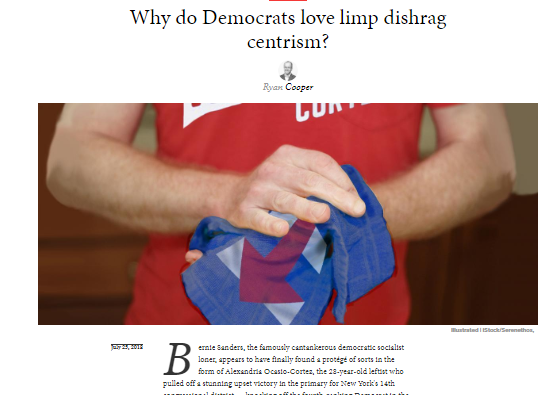History Shows Why It’s Not Enough to Be a Centrist Democrat

Here’s an essay I wish I had written: Why do Democrats love limp dishrag centrism?, by Ryan Cooper. It eloquently expresses a lot of things I’ve been saying for a long time. Spend a few minutes reading it, then please come back here for some deeper context and a longer, more historical perspective. The link will open a new tab, so this one will still be up on a computer screen (not true from a phone, but you should have a Back arrow)
Consider these tidbits:
- The last non-incumbent Democrat who won the presidency as an obvious centrist without a third-party candidate siphoning off significant votes from the Republicans was Jimmy Carter; the one before was John F. Kennedy. Bill
Clinton had help from the third-party campaign of H. Ross Perot. Obama ran on a platform of “Hope and Change” that looked pretty progressive if you didn’t look too closely. LBJ was already an incumbent in 1964, and withdrew his bid in 1968 in the face of progressive challenges from Bobby Kennedy and Eugene McCarthy. Centrists Carter (running for re-election in 1980), Mondale (1984), and Dukakis (1988) lost honestly. Gore (2000), Kerry (2004), and Hillary Clinton (2016) chose not to seriously contest highly suspicious election results. - Bernie Sanders, an open progressive, won 23 primaries against Hillary Clinton, a centrist. In the swing states, where a person’s vote actually matters, he took Wisconsin, Michigan, Colorado, and New Hampshire–while her primary strength included many die-hard Republican states she had little or no chance of winning in the general election. Yet she took even swing states for granted, not even bothering to make a single appearance in Wisconsin between being nominated and the general election despite losing the primary by an astonishing 13.5 points. In Michigan, her campaign again took the state for granted and refused to respond to field organizers’ urgent calls for help–foregoing on-the-ground canvassing and lit drops as well as any significant TV advertising presence. As Cooper notes, she was clueless about the impact of Obama’s economic policies (bail out the banks, but hang working-class homeowners facing foreclosure out to dry) on working families in Rust Belt states. Sanders’ call for change was replaced by a sense of entitlement embodied in that “dishrag” slogan “I’m with her.” And Obama’s failure to show how he was helping working-class families even when Gallup named good jobs the number one issue in the 2012 Presidential election definitely hurt the Hillary campaign; she was seen as an out-of-touch Washington elitist.
- It is true that the only progressive nominated in my lifetime to head the ticket of a major party, George McGovern, was badly defeated. However, there were a number of factors besides his agenda: He threw his running mate under the bus after saying he’d stand behind him “1000 percent.” He was an incredibly uncharismatic campaigner (at age 15, I witnessed one of his pathetic rallies). And he couldn’t count on his greatest constituency–antiwar youth–because 18-to-20 year olds didn’t get the right to vote until 1971. And, just like Howard Dean, Dennis Kucinich, and Bernie Sanders in more recent years, he got basically no support–let’s state the truth: active hostility–from the Democratic Party establishment. As that same NPR piece that reported on McGovern’s VP fiasco notes,
The post-election reforms instituted by Sen. George McGovern (D-SD) made sure that, starting in 1972, delegates would be decided in primaries, not backroom deals, and that primaries — not smoke-filled rooms — would determine the nominee. The fact that McGovern, a strong opponent of the war, would win the nomination — helping, along the way, to curtail the power of such longtime Democratic leaders/bosses like Daley — was one reason why many in the Democratic Old Guard refused to unite behind their presidential candidate.
Interestingly, that same NPR link also shows that people respect and support candidates who actually have the guts to stand up and fight. In response to a reader question lower on the page, writer Ken Rudin points out that only one of the 126 Democrats who voted against the Iraq war in 2002 lost that November. I know that in my own district, I felt that his vote against the war was important enough that I voted for Richie Neal for the first and only time. My town has since been moved to an adjoining district, but I’m actively supporting and advising Neal’s progressive opponent, Tahirah Amatul-Wadud.
The Democrats need to realize that they are sabotaging themselves when the sabotage progressive candidates and refuse to fight against the continuous Republican encroachments. They need to stand up and fight back when the Mitch McConnells of this country undermine the people’s agenda. They need to give active support to candidates who inspire, and can win. The same old same old doesn’t cut it anymore. Cooper’s “dishrag centrists” won’t win a majority in Congress, and those elected won’t be a force for change. They need to recognize that even many of the votes for DT were votes for change, and that they could harness that momentum for a progressive agenda.
Poll after poll shows that like the rest of the world, America wants things like good jobs with good benefits, affordable healthcare and education, and a clean environment. Yet so many elected Democrats are too timid to go after these things–even though European citizens have enjoyed them for decades. And that’s why centrist Democrats keep losing elections. It reminds me of the way Michael Dukakis let George H.W. Bush back him into the corner by refusing to defend his liberal credentials (I’m still proud of this piece I wrote a year and a half ago).
It’s time to change that. Run good candidates. Take back the House and maybe the Senate. Push the people’s agenda. Call out the Republican traitors, saboteurs, and liars; oppose them at every turn. And run someone who has skills, experiences, AND an agenda to lead the ticket in 2020. Fighting the slide toward fascism is not enough. The Dems must be for a positive agenda as well as against their opponent’s agenda. This a point even made in this New York Times “report” on DT’s hypothetical 2020 re-election. While the author’s intent was to warn against a slate that’s too progressive, to me the message to the Democrats is not that at all, but to make sure that any progressive slate has a powerful agenda that helps ordinary people.

